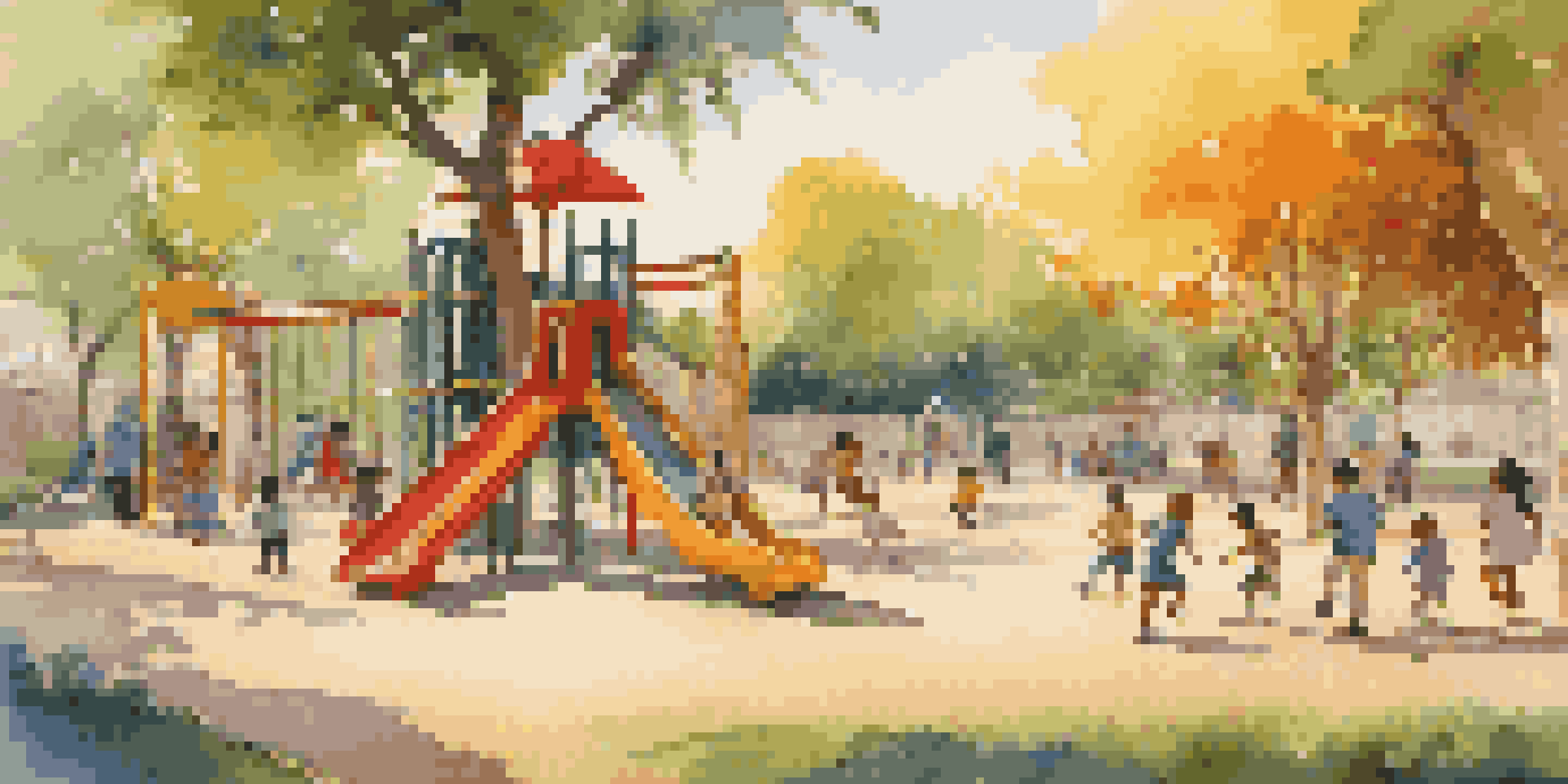The Importance of Play: Enhancing Youth Mental Wellness

Understanding Play: More Than Just Fun and Games
Play is often seen as a simple pastime, but it serves a much deeper purpose in children's development. It provides a safe space for kids to explore their emotions, develop social skills, and understand the world around them. Just like how a sponge soaks up water, children absorb lessons about cooperation, empathy, and problem-solving through play.
Play is the highest form of research.
Engaging in different types of play—whether it be imaginative games, sports, or creative activities—allows children to express themselves freely. This expression is crucial for mental wellness as it offers a release for stress and anxiety. For instance, a child playing dress-up can explore various identities, helping them understand who they are and what they feel.
Moreover, play acts as a natural stress reliever. Much like how laughter can lighten a heavy mood, play encourages joy and reduces feelings of overwhelm. When kids immerse themselves in play, their worries seem to fade, creating a much-needed balance in their emotional lives.
The Link Between Play and Emotional Resilience
Emotional resilience is the ability to bounce back from challenges, and play is a vital component in building this trait. Through play, children learn to navigate ups and downs, whether winning or losing a game. This experience teaches them that setbacks are a part of life and can be overcome, much like how a rubber band stretches but eventually snaps back.

For example, team sports can foster resilience by teaching kids how to work together, communicate effectively, and support one another during tough times. They learn that it's okay to fail, and that every experience contributes to their growth. This lesson is invaluable in helping them cope with life's adversities as they grow.
Play Enhances Emotional Development
Play provides a safe environment for children to explore emotions, develop social skills, and build resilience.
Additionally, play can help children process their emotions. Engaging in role-play scenarios allows them to act out their feelings and confront fears in a safe environment. This not only enhances their emotional intelligence but also equips them with tools to manage stress in real-life situations.
Social Skills Development Through Play
Play is a powerful facilitator of social skills. When children interact with peers during playtime, they learn important lessons about sharing, negotiation, and conflict resolution. Imagine a group of kids building a sandcastle together; they must communicate and collaborate to create their masterpiece, mimicking real-world teamwork.
Children learn as they play. Most importantly, in play, children learn how to learn.
These social interactions are crucial for developing empathy, as children learn to recognize and respond to the feelings of others. Just as a mirror reflects an image, play reflects a child's understanding of social dynamics, helping them navigate friendships and peer relationships effectively.
Moreover, play can also provide a sense of belonging. When children engage in group activities, they forge connections and strengthen their support networks. This sense of community is essential for mental wellness, as it reassures kids that they are not alone in their experiences.
Creative Play: Fueling Imagination and Problem-Solving
Creative play, such as arts and crafts or imaginative storytelling, nurtures a child's creativity and problem-solving skills. By allowing children to think outside the box, they learn to approach challenges with innovative solutions. Think of it as a workout for the brain, where each creative endeavor strengthens their mental agility.
When children invent stories or build structures from random materials, they engage in critical thinking and experimentation. This process enhances their cognitive abilities and encourages them to take risks in a safe environment. For instance, a child creating a fort from pillows learns about engineering principles while having fun.
Creative Play Fuels Imagination
Engaging in creative play nurtures problem-solving skills and boosts self-esteem through exploration and innovation.
Additionally, creative play fosters a sense of accomplishment. Completing a project or bringing an idea to life boosts self-esteem, further enhancing mental wellness. Just as a gardener feels pride when their flowers bloom, children experience joy and confidence in their creative expressions.
Physical Play: Boosting Mental and Physical Health
Physical play, like running, jumping, or playing sports, is vital for both mental and physical health. It releases endorphins, the body's natural mood lifters, which can significantly reduce feelings of anxiety or depression. Think of it as a joyful dance that not only keeps the body fit but also elevates the spirit.
Engaging in physical activity helps improve focus and cognitive function, making it easier for children to absorb information in school. Just like how a well-oiled machine operates efficiently, a healthy, active body supports a sharp mind, leading to better academic performance.
Moreover, physical play often involves social interaction, further enhancing its benefits. Whether it's a game of tag or a friendly soccer match, these activities encourage teamwork and camaraderie, fostering connections that are crucial for emotional well-being.
The Role of Adults in Facilitating Play
While play is inherently a child-led activity, adults play a crucial role in facilitating and encouraging it. Parents, teachers, and caregivers can create environments that prioritize play, whether through organized activities or simply allowing free time. It's much like setting the stage for a performance; the right environment can inspire amazing creativity.
Additionally, adults can model positive play behaviors. By participating in play with children, they demonstrate the value of teamwork, creativity, and emotional expression. This engagement not only strengthens bonds but also gives children a sense of security and support.
Safe Spaces Promote Mental Wellness
Creating safe environments for play allows children to express themselves freely, enhancing their emotional and social well-being.
Moreover, adults should recognize the signs of stress or emotional distress in children. By promoting play as a coping mechanism, they can provide children with the tools they need to manage their feelings effectively. Just as a gardener tends to their plants, nurturing play can help children flourish emotionally.
Creating Safe Spaces for Play
Creating safe spaces for play is essential for promoting mental wellness in children. These spaces can be physical, like parks or playgrounds, or emotional, such as supportive home environments. Just as a bird needs a safe nest to thrive, children require secure spaces to explore and engage in play.
In these safe environments, children can express themselves freely without fear of judgment. This freedom encourages exploration and creativity, allowing them to discover their interests and passions. For instance, a child feeling comfortable in a welcoming space might confidently try out new activities or make new friends.

Furthermore, communities can work together to ensure access to safe play areas for all children. This communal effort not only enhances children's mental wellness but also strengthens community ties. Much like a web, the connections formed through shared play experiences create a supportive network that benefits everyone.
Conclusion: Embracing Play for a Healthier Future
As we navigate the complexities of modern life, the importance of play for youth mental wellness cannot be overstated. Play is not just a luxury; it is essential for a child's emotional, social, and cognitive development. By embracing play, we invest in a healthier, happier future for our children.
Encouraging diverse forms of play—be it physical, creative, or social—can help children build resilience, confidence, and strong relationships. Just like planting seeds in a garden, nurturing play today will yield a bountiful harvest of emotional well-being tomorrow.
In conclusion, let's commit to prioritizing play in our children's lives. By fostering an environment that values play, we equip the next generation with the tools they need to navigate life's challenges with joy and resilience.